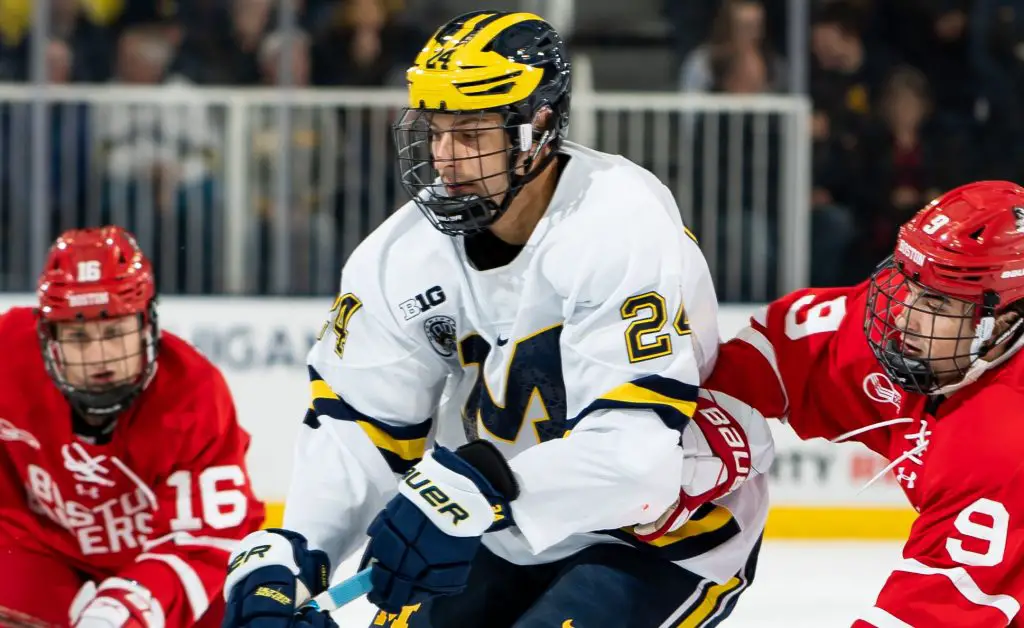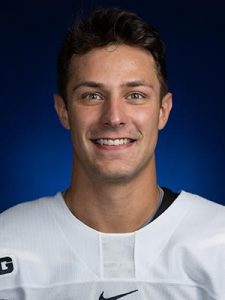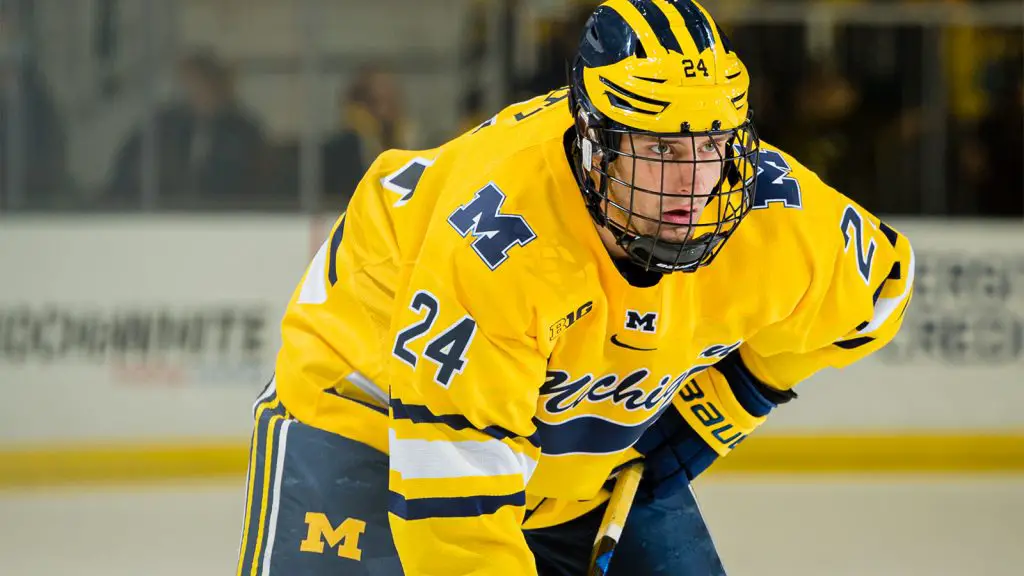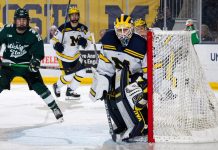
This is a story about Steven Holtz, a player you may not know who nearly lost his life to adenovirus in November.
This is also about an interim head coach whose approach exemplifies a new – and welcome – way of defining what it means to be a college coach.
It’s also the story of how frightening the world can feel since we’ve witnessed a pandemic firsthand.
And this is the story of how Jacob Truscott’s late-night trip to the bathroom on Nov. 13, 2022, saved Steven Holtz’s life.
We’ll start with that last part first.
Holtz and Truscott share a house with teammates Eric Ciccolini and Philippe Lapointe. Early in the morning of Nov. 13, the Wolverines had returned from South Bend, where they’d split a pair of games with Notre Dame. Holtz stayed behind in Ann Arbor because he wasn’t feeling well.
When his housemates got home following the trip, they checked on him in a typical way, calling through the door of his bedroom and asking if he needed anything. “They told me later that I told them to get away and leave me alone,” Holtz said.
Told him later, Holtz said, because he has no memory at all of what happened – not that night, not from the days leading up to that night, not for about a week afterward. “I almost look at it like it’s the story of someone else,” said Holtz.
Around 10:30 that Sunday night, as Holtz tells it, Truscott “thankfully” had to “take a pee.”
“He heard me in my bedroom, wheezing,” said Holtz, who demonstrated with big, whooping breaths in and out, “gasping for air. My room is right next to the washroom. He heard it and he said he stopped and stood in front of my door to see what it was, because it sounded so abnormal.
“He said that all of a sudden it stopped, and then he opened the door, and I was sitting, having a seizure.”
The housemates called 9-1-1. The police arrived and asked if there was any chance of drug use. (There wasn’t.) Could someone have been in the house with Holtz, they wanted to know. (Other than his girlfriend Emma, very unlikely.) Could this be a suicide attempt? (No.)
An ambulance took Holtz to the University of Michigan hospital, where he was admitted to the ICU. “They think that I had another seizure in the ambulance as well,” said Holtz. “I had two seizures that they know of. They think I could have been having seizures all day that day because of my condition when they found me.”

Soon after being admitted to ICU, Holtz was intubated and put in a medically induced coma. “I’m not sure of the duration,” said Holtz. “A couple of days.”
Holtz was told afterward that no one initially knew what was wrong with him, that medical staff had considered the possibility of several pathogens including bacterial meningitis, a highly contagious, potentially lethal infection that can escalate quickly.
Here’s where the story takes a turn that plays on our COVID-heightened sensibilities. Many players on the Michigan team also got sick, and Truscott was one of five additional players who were hospitalized. No one but Holtz had seizures and memory loss, but since medical staff didn’t know at first what was causing the outbreak, there was an additional element of apprehension. Truscott began to feel sick the night that Holtz was hospitalized, and he admits that he was scared.
“Obviously, you see that and you don’t want that to happen to you,” said Truscott. “We didn’t know what it was. I wasn’t really feeling well, so a teammate slept in the living room with me to keep an eye on me. Needless to say, we didn’t get much sleep.”
It was the following day that Truscott went to the hospital himself. “I was just there for the night,” he said, “getting some tests and making sure I didn’t have meningitis.”
All of the hospitalized Wolverines except for Holtz were released soon and recovered quickly. Adenovirus is a common respiratory illness, usually causing cold symptoms. It’s rarely life threatening.
Holtz’s experience seems to have begun the first weekend of November, when Michigan traveled to play Penn State. Holtz said that a couple of players weren’t feeling well, that one player didn’t make the trip. “I started feeling sick that following Tuesday,” said Holtz. “I just had the classic flu symptoms like chills, headache, just feeling under the weather.”
He said that he remembers going to lift weights that day and that he couldn’t manage 100 pounds. “I felt so weak, just so drained. I ended up not practicing that day.”
After visiting a campus clinic, he was sent home and told to stay hydrated, eat well, and get some rest. “They sent me home. It was a classic cold.”
Until it wasn’t.
On Nov. 8 – the day that Holtz visited the campus clinic – the University of Michigan issued a statement warning that increased local cases of “COVID-19, seasonal influenza, respiratory syncytial virus (RSV), adenovirus and many other respiratory viruses” could disrupt end-of-semester plans for the campus community.
Two days later, the Wolverines left for South Bend, and that’s the day that Holtz thinks that things got bad for him.
“I have a problem with memory,” said Holtz. “I ended up having to go back and look at all my texts, looking to see who I was texting through that first week.” He said he remembers texting his parents and his girlfriend.
“This is where I’m pretty unclear,” said Holtz, “and to be honest, everyone is pretty unclear. My mom and dad said I called them on Thursday saying that I woke up that day and felt somewhat better. My girlfriend had brought me food and she basically forced me to eat and drink.
“Apparently, I cleaned the whole house on Thursday because I felt bad. My roommates said I disinfected the whole house. Apparently, I was driving around. I went to Panera. I don’t remember any of this. It’s really weird. I don’t remember a single thing. This is all from my parents and girlfriend telling me what happened.
“I ended up having to go get tested again for flu and mono, I think, the night before I got put into the hospital, but I don’t think anyone really knows what happened from Thursday to Saturday.”
That part, the stretch of time when no one had a good grasp of what was unfolding, is something that Holtz’s teammates will safeguard against in the future.
“It was pretty tough seeing what happened,” said Truscott. “It brought perspective on life, how important it is to check in on your teammates because you never know what can happen. From then on out, we’ve talked as a group about the importance of checking in on each other, especially when guys are sick.”
Teams leave sick players behind all the time, thinking that they’ll ask for help when they need it. Young, strong, healthy athletes are not hospitalized for the common cold.
“We don’t know what led to that,” said Truscott, “but it’s important that we’re there to make sure that guys are taken care of.”
The culture of caring that’s further developed since Holtz’s illness and the team’s brush with adenovirus extends beyond the players. First-year, interim head coach Brandon Naurato is transparent about a more holistic approach to coaching. He credits his staff – director of hockey operations, Topher Scott, and assistant coaches Rob Rassey and Bill Muckalt – for creating an atmosphere where players are encouraged to communicate about more than just the game they’re playing.
“Topher does a lot of individual meetings about life skills and leadership talks with them,” said Naurato. “[Trainer] Brian Brewster and the strength coach Joe Maher are another support group that the kids feel comfortable with.
“We’re just trying to be there for these guys. We’re not going to motivate like these old-school coaches through extrinsic motivation like fear and verbal abuse. We’re going to be honest with them and be firm, but it’s all to help. If we help every individual player become better or more mentally strong, then collectively it helps the group. We’re not perfect, either, but we’re trying to communicate with the kids and give them a voice.”
After serving as an assistant coach at Michigan under Mel Pearson for the 2021-2022 season, Naurato was named interim head coach last August when Michigan declined to renew Pearson’s contract following an investigation that alleged that Pearson created a toxic culture in the Michigan hockey program.
Taking the interim position under such circumstances would have been enough for Naurato to be sensitive to what returning Michigan players might need, but in October of last year, the entire Michigan hockey family was dealt the unexpected blow of equipment manager Ian Hume’s death. Hume had been with the program for 33 years. He was the equipment manager when assistant coach Bill Muckalt was a player on two national championship teams in 1996 and 1998. Hume was there from 2005 to 2009, when Naurato was a Wolverine.

And as the Wolverines were dealing with Hume’s death, they almost lost Steven Holtz.
“I’ll never forget the phone call from Jacob Truscott and what he said to me, and then just for 30 minutes not talking to anyone else and not knowing,” said Naurato. “Then even the updates that I got, they weren’t good updates. We had no clue what it was or why. You didn’t suspect foul play with a kid like Holtzy. And then for him to come out of it was almost like a miracle, after everything we were told.”
Truscott credits Naurato’s guidance for Michigan’s success this season.
“The stuff he’s been through, especially for a first-year head coach, is insane,” said Truscott. “He’s done a wonderful job. He’s unbelievable. He’s one of the best humans I’ve ever met. I speak highly of him.”
The Wolverines are now 4-2-0 in their last six games, having swept Penn State last weekend and split with both Minnesota and Ohio State, all teams ahead of them in the Big Ten standings. Truscott said that as cliched as it may sound, everything the Wolverines have faced this year has brought them closer together on and off the ice.
“We know we’ve had a special team all year long,” said Truscott. “We’re realizing we can do something special with all the stuff we’ve faced.”
As for Holtz, he’s waiting to clear academic eligibility again before he can play. A mechanical engineering major, Holtz is finishing up the incompletes he took last semester on top of his current course load.
“He’s a smart kid,” said Naurato. “He’s been working double time even with everything going on to catch up. I think that’s his light at the end of the tunnel, getting back from a hockey standpoint.”
Truscott said that he and his housemates have to resist the urge to be overprotective of their friend.
“He likes doing stuff on his own,” said Truscott. “We have to respect that and not be there too much. We have to give him his space as well as being there for him. He’s done a good job getting back into things. He works his butt off every single day. You can see how hard he works.”
Holtz experienced some profound memory loss with his illness. He couldn’t remember his girlfriend, or the names of the freshmen on the team, or that Naurato was now his head coach rather than an assistant. That’s something he’s had to work on.
And he’s sought help for the emotional trauma that came with his experience.
“Trust me, I’ve sat thought ‘what ifs.’ What if they didn’t come back from Notre Dame? What if I had this big seizure when they were gone? What if Jacob didn’t have to pee?”
Holtz said that he started talking to a counselor a couple of weeks after Thanksgiving. “That’s when I started to have the ‘what if’ thoughts, lots of trouble sleeping, lots of bad dreams.” Holtz said that he’s never “really been one to go and talk to people about that stuff,” but he knew he needed support and additional medical help to process everything. “It’s helped out a lot.”
His experience has “completely changed” his perspective, said Holtz, and he hopes that sharing it will help people think about their priorities. “People worry about small, little things. Not everyone has to have this huge impact on the world. It could be something as simple as looking out for a friend or making someone smile.”
Holtz said that he’ll never take hockey – or his hockey people – for granted again. “Every one of my teammates, the coaches, the staff, they’re all family to me.”
In summing up his experience, Holtz had difficulty in part because it’s an ongoing process, but also because he said he feels “weird” saying something so simple. “It’s just so cool to be living.” Who can argue with that?
“Two months ago, I was in a coma,” said Holtz. “I feel pretty damned good, all things considered.”


